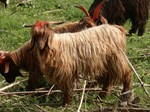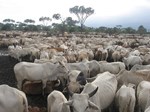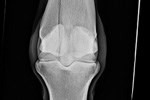Search - Research
341 - 350 of 388 results
-
New research traces origins of zoonotic disease to the Neolithic period
Study provides evidence for hypotheses about the effects of farming on human and animal health and wellbeingNew research has investigated the possible origins of the common zoonotic disease brucellosis in …
-
New review on antimicrobial resistance in livestock highlights knowledge gaps which threaten global health
FAO paper on the epidemiology of antimicrobial resistance in animal production highlights substantial research gaps and recommends a One Health approachResearchers at the Royal Veterinary College (RVC) have highlighted substantial research gaps in the …
-
Professor Jonathan Elliott of the RVC awarded Honorary Member of the American College of Veterinary Internal Medicine
Jonathan Elliott, Professor of Veterinary Clinical Pharmacology at the Royal Veterinary College (RVC), has been awarded Honorary Member status in Small Animal Internal Medicine by the American College of Veterinary Internal Medicine (ACVIM). The …Jonathan Elliott, Professor of Veterinary Clinical Pharmacology at the Royal Veterinary College ( …
-
New Thoroughbred genetic fracture risk scoring system developed by the RVC discovers collagen is contributing factor
New research from the Royal Veterinary College (RVC) into genetic risks of fracture in Thoroughbred horses has found that horses with lower levels of collagen type III have a higher risk of fracture. Previously, there has been limited research …New research from the Royal Veterinary College (RVC) into genetic risks of fracture in Thoroughbred …
-
New research from the RVC predicts the future life expectancy for companion cats
New research from the Royal Veterinary College (RVC), in collaboration with researchers from the National Chung Hsing University (NCHU) in Taiwan, has produced the first-ever ‘life tables’ for the UK companion cat population. This represents a major … -
New RVC research reveals different endothelial cell responses between humans and horses
New research from the Royal Veterinary College (RVC) has revealed a fundamental difference between how the cells which line blood vessels (endothelial cells), react in horses compared to humans. Regulating the factors that influence endothelial cell …New research from the Royal Veterinary College (RVC) has revealed a fundamental difference between …
-
Hop to it: New research explores the muscle anatomy of frogs in relation to their movement
Researchers from the Royal Veterinary College (RVC) and UCL have uncovered anatomical differences between species of frogs specialising in different locomotor styles. Jumping, swimming, burrowing, walking and climbing frogs were all found to differ … -
RVC research highlights the potential gains from early conversations and treatment for newly diagnosed cats with diabetes
New research from the Royal Veterinary College (RVC) has shed new light on the epidemiology, risk factors and outcomes for cats diagnosed with diabetes mellitus in the UK. The findings offer vital information for veterinarians and owners that could … -
New RVC study sheds light on the prognosis of aggressive canine cancer
New research from the RVC VetCompass Programme has provided fresh insights into survival rates for dogs diagnosed with haemangiosarcoma, one of the most aggressive cancers in companion animals. Despite an association with extremely poor survival … -
Global expert report provides new comprehensive recommendations for One Health
The Royal Veterinary College (RVC) has co-authored a new report, as part of the Lancet One Health Commission, which provides a framework and recommendations for implementing an effective One Health approach. It aims to bring together human, animal, …The Royal Veterinary College (RVC) has co-authored a new report, as part of the Lancet One Health …










